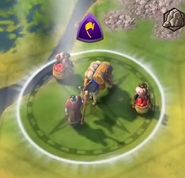The Settler is an Ancient Era civilian unit in Civilization VI. It is available without any technological research.
- Attributes:
Strategy
Settlers are used to expand your empire. Whenever a Settler unit is built or purchased in a city, that city's ![]() Population is lowered by 1 as some of your people strike out to settle new lands.
Population is lowered by 1 as some of your people strike out to settle new lands.
Conveniently, Settlers have greater sight than all other starting units, which allows them to spot good city locations from afar. However, don't get tempted to use them for scouting! First, they will be much, much more useful the sooner they Found a city, then walking around searching for Tribal Villages and such. Secondly, as civilian units Settlers are defenseless, so it's prudent to escort them with a military unit as they search for a good place to found a new city. Unlike in Civilization V, a Settler that is captured from another civilization will remain a Settler under the control of the civilization that captured it.
Civilopedia entry
Since the first Neanderthal crawled out of his cave, scratched himself, and wondered if the grass was greener on the other side of the hill, there have been those willing to leave behind everything familiar in the hopes of finding a better life over that hill. These are the settlers, the ones who scattered mankind over the globe. Whether they travelled by water or by land or by air, the pioneers eventually came to a place they liked, usually one that offered good soil, clean water, and some prospect of safety … but not always. Some ended their journey in desert, marsh, ice field, or mountain valley. And, inevitably, among hostile natives. The reasons they left their old homes behind were as varied as the terrain they traversed: hunger, wealth, ambition, adventure, fear, freedom, and above all the hope for their descendants to have what they did not. Where they stopped became villages, towns, cities, and civilizations. And, the cycle began again ...

